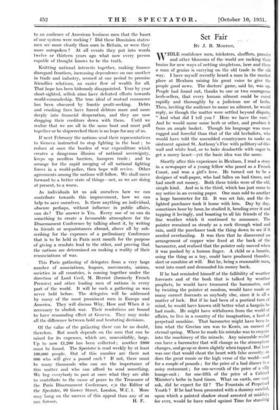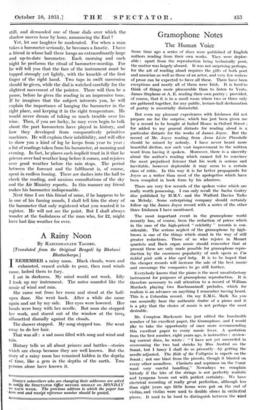Set Fair
BY J. B. MORTON.
WHILE confidence men, tricksters, shufflers, pannies and other blossoms of the world are racking their brains for new ways of netting simpletons, here and there a man of genius is carrying on the old trade in the old way. I have myself recently heard a man in the market place at Hexham raising his great voice to give the people good news. The doctors' game, said he, was up. People had found out, thanks to one or two courageous herb-sellers, that every human ailment could be cured rapidly and thoroughly by a judicious use of herbs. Then, inviting the audience to name an ailment, he would reply, as though the matter were settled beyond dispute, " And what did I tell you ? Here we have the cure.'' And he would name some herb or other, and produce it from an ample basket. Though his language was more rugged and forceful than that of the old herbalists, who would have told the assembled countrymen to make an ointment against St. Anthony's Fire with pellitory-of-the. wall and white lead, or to bake deadnettle with sugar to get a merry heart—yet the basic idea was the same.
Shortly after this experience in Hexham, I read a story in a newspaper of a young fellow who posed as a French Count, and won a girl's love. He turned out to be a designer of wall-paper, who had fallen on bad times, and had smelt out money. Both these tricks were of the old, simple kind. And so is the third, which has just come to my notice in an evening paper. One man sold to another a large barometer for £2. It was set fair, and the de- lighted purchaser took it home with him. Day by day, sometimes hour by hour, he studied it, bending over it and tapping it lovingly, and boasting to all his friends of the fine weather which it continued to announce. The pointer remained as steady as a rock through wind and rain, until the purchaser took the thing down to see if it needed overhauling. It was then that he discovered an arrangement of copper wire fixed at the back of the barometer, and realised that the pointer only moved when it was pushed by a human finger. A child or .a lunatic, using the thing as a toy, could have produced thunder, sleet or sunshine at will. But he, being a reasonable man, went into court and demanded his money back.
If he had reminded himself of the fallibility of weather forecasts and of the bosh that is talked by weather prophets, he would have treasured the barometer, and by twisting the pointer at random, would have made as many correct forecasts as anybody else, since it is all a matter of luck But if he had been of a poetical turn of mind, he would have known still better what a-bargain he had made. He might have withdrawn from the world of affairs, to live in a country of the imagination, a land of perpetual sunshine. That barometer might have been to him what the Grecian urn was to- Keats, an earnest of eternal spring. Where he made his mistake was to enquire into the machinery of the miracle. Any miserable realist can have a barometer that will change as the atmosphere changes; and go up or down slightly when tapped. But here was one that would cheat the heart with false security, as does the great music or the high verse of the world—and for a couple of pounds ; for the price of a bad dinner in a noisy restaurant ; for one-seventh of the price of a silly lounge-suit ; for one-fifth of the price of a Cabinet Minister's bribe in hard times. What on earth, one may ask,' did he expect for £2 ? The Fountain of Perpetual Youth? If he had been presented with a dummy sundial, upon which a painted shadow stood arrested at -midday, for ever, would he have railed against Time for standing still, and demanded one of those dials over which the shadow moves hour by hour, announcing the End ?
Yet, let our laughter be moderated. For when a man takes a barometer seriously, he becomes a fanatic. I have a friend in whose hall there hangs an extraordinarily large and up-to-date barometer. Each morning and each night he performs the ritual of barometer-worship. For he will tell you that the face of the instrument must be tapped strongly yet lightly, with the knuckle of the first finger of the right hand. Two taps in swift succession should be given, while the dial is watched carefully for the slightest movement of the pointer. There will then be a pause, before he gives the reading in an impressive tone. If he imagines that the subject interests you, he will explain the importance of hanging the barometer in the right place, and keeping it in the right temperature. He would never dream of taking so much trouble over his wine. Then, if you are lucky, he may even begin to talk about the part barometers have played in history, and how they developed from comparatively primitive machines. He will explain their infallibility, and will offer to show you a kind of log he keeps from year to year ; a list of readings taken from his barometer, at morning and evening. In fact, he places such implicit trust in it that he griev.es over bad weather long before it comes, and rejoices over good weather before the rain stops. The period between the forecast and the fulfilment is, of course, spent in endless fussing. There are dashes into the hall to check the reading, and anxious consultations of the sky and the Air Ministry reports. In this manner my friend makes his barometer indispensable.
„Next time I see this friend of mine, if he happens to be in one of his fussing moods, I shall tell him the story of the barometer that only registered what you wanted it to register. He will not see the point. But I shall always wonder at the foolishness of the man who, for £2, might have had fine weather for ever.



















































 Previous page
Previous page